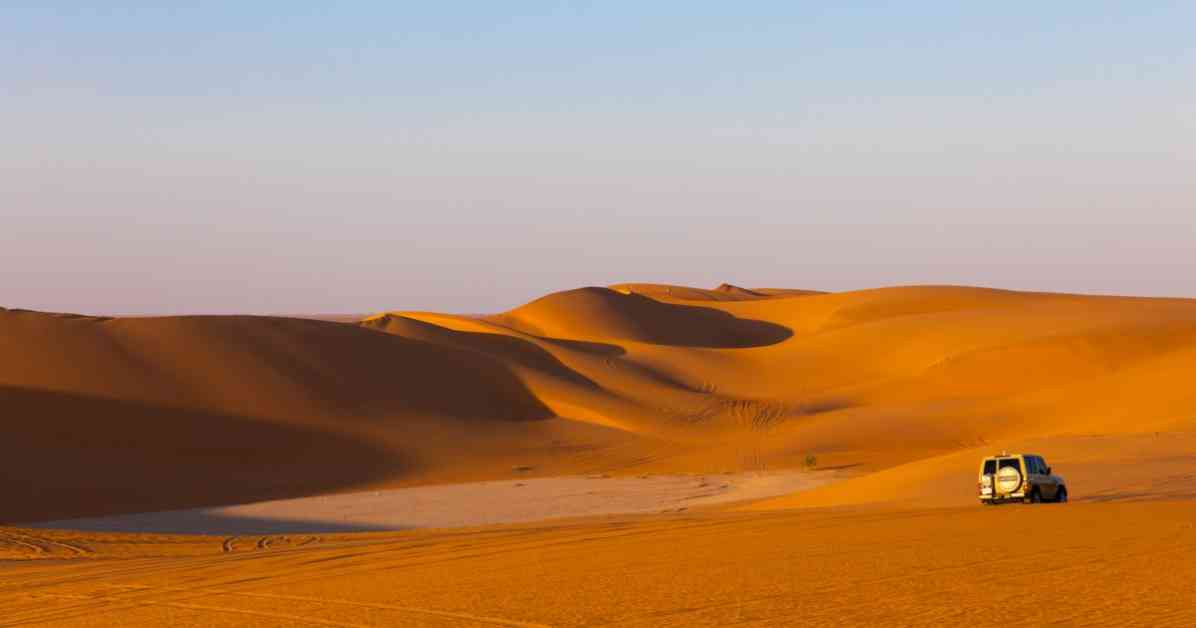Two men tragically lost their lives in the world’s largest sand desert, the Rubʿ al-Khali, due to a GPS failure. Spanning a whopping 650km across, this vast expanse of sand in Saudi Arabia is so immense that GPS is a necessity to navigate its harsh terrain. The desert, also known as the Empty Quarter, is characterized by its endless stretches of sand, with dunes reaching heights of up to 2,000ft.
Despite its enormity, the Rubʿ al-Khali is almost entirely uninhabited and remains largely unexplored, with vast oil fields lying beneath its surface. The only lifeline for travelers in this desolate landscape is Saudi Arabia’s Highway 10, the world’s longest straight road spanning 256km. Off-road navigation in the desert is nearly impossible without the aid of GPS technology.
The tragic incident occurred when telecommunications worker Mohammad Shehzad Khan, 27, and his colleague lost signal while driving through the Rubʿ al-Khali a week ago. As temperatures in the desert soar above 40°C during the day, the situation quickly turned dire for the stranded men. Without a means to find their way out or call for help, the duo was left stranded with no food, water, or fuel for their vehicle.
After four days of being missing, the bodies of Khan and his Sudanese colleague were discovered covered in sand next to their car. Both men had succumbed to dehydration and exhaustion, highlighting the unforgiving nature of the desert they found themselves lost in. Khan, originally from the Indian state of Telangana, had relocated to Saudi Arabia three years prior in pursuit of work opportunities.
The Rubʿ al-Khali stands as a stark reminder of the dangers posed by nature’s extremes and the importance of proper preparation when venturing into such harsh environments. The vastness and desolation of the world’s largest sand desert serve as a sobering reality for those who dare to explore its treacherous terrain.
Exploring the Rubʿ al-Khali
The Rubʿ al-Khali is a place of extremes, where the scorching sun beats down on endless sand dunes that seem to stretch on forever. Despite its harsh conditions, the desert holds a certain allure for adventurers and explorers seeking to test their limits in one of the world’s most challenging environments.
The sheer size of the Rubʿ al-Khali is awe-inspiring, with its vast expanse of sand stretching out in all directions as far as the eye can see. Navigating this vast desert without the aid of GPS is a daunting task, as the landscape offers little in the way of landmarks or reference points to guide travelers on their journey.
For those brave enough to venture into the Rubʿ al-Khali, the experience can be both exhilarating and terrifying. The isolation and solitude of the desert are palpable, with the only sounds being the shifting of sand in the wind and the occasional distant rumble of a passing vehicle.
The Importance of GPS in the Desert
In a place as vast and unforgiving as the Rubʿ al-Khali, GPS technology can mean the difference between life and death for those attempting to navigate its challenging terrain. The ability to pinpoint one’s location and plot a course through the desert is paramount, as getting lost in such a vast expanse of sand can quickly turn into a fight for survival.
For travelers like Khan and his colleague, the failure of their GPS signal proved to be a fatal mistake. Without the ability to determine their location or find a way out of the desert, they were left stranded and vulnerable to the harsh conditions that ultimately led to their tragic demise.
Lessons Learned from Tragedy
The deaths of Khan and his colleague serve as a sobering reminder of the dangers posed by the Rubʿ al-Khali and other extreme environments around the world. While the allure of exploration and adventure may draw individuals to such places, it is essential to prioritize safety and preparedness when venturing into the unknown.
Proper planning, adequate supplies of food and water, and a reliable means of communication are essential when traveling through remote and inhospitable landscapes like the Rubʿ al-Khali. Additionally, maintaining a healthy respect for the power of nature and the unpredictability of the environment can help prevent tragedies like the one that befell Khan and his colleague.
As travelers continue to seek out new challenges and experiences in the world’s most extreme environments, it is crucial to approach these adventures with caution and mindfulness. The Rubʿ al-Khali may be the largest sand desert on earth, but it is also a place of beauty, mystery, and danger that demands respect from those who dare to explore its vast and unforgiving landscape.












